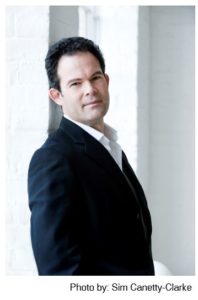Toronto, May 22, 2019 – One of Canada’s leading singers and dramatic interpreters of his generation, bass baritone Gerald Finley, is the recipient of the $30,000 Paul de Hueck and Norman Walford Career Achievement Award. The award recognizes outstanding achievement in the field of classical singing, and was presented last evening at a special event in conjunction with the Canadian Opera Company’s Otello where Mr. Finley performed the role of Iago.

About Gerald Finley
Gerald Finley began singing as a chorister in Ottawa, Canada, and completed his musical studies in the UK at the Royal College of Music, King’s College, Cambridge, and the National Opera Studio. He has garnered great international acclaim and has sung all the major baritone roles of Mozart. His Don Giovanni has been seen in New York, London, Paris, Rome, Vienna, Prague, Tel Aviv, Glyndebourne and Budapest, and recently at the festivals of Salzburg and Munich. As Count Almaviva in Le nozze di Figaro, his appearances include the Royal Opera Covent Garden, Salzburg Festival (2007, 2009), Paris, Amsterdam, with further appearances at the Metropolitan Opera New York, Vienna’s Staatsoper and Munich’s Bayerische Staatsoper.
In recent years, acclaimed appearances have included returning to Toronto as Verdi’s Falstaff, at Chicago Lyric Opera as Wolfram (Tannhäuser), at the Met as Nick Shadow, in the title role of Rossini’s Guillaume Tell at Covent Garden, the Met and in Munich and as Hans Sachs at the Opera de Paris and Glyndebourne in two celebrated productions of Die Meistersinger von Nürnberg.
His work in contemporary opera and orchestra in concert is equally prestigious. In recent seasons, he has premiered new works written for him including Peter Lieberson’s Songs of Love and Sorrow with the Boston Symphony Orchestra, “True Fire” by Kaija Saariaho at the Los Angeles Philharmonic with Gustavo Dudamel, and he premiered and recorded a new orchestral work “Rubáiyát” by the late Finnish composer Einojuhani Rautavaara with the Helsinki Philharmonic and John Storgårds.
Finley was appointed an Officer of the Order of Canada in July 2014, and was appointed a Commander of the Order of the British Empire in 2017.
Jury Comments
The jury was unanimous in their praise of Finely, stating “Gerald Finley has a superlative voice that continues to develop as his career grows. The sheer breadth and range of the work he tackles is awe-inspiring. He performs all over the world with high-calibre conductors and musicians and does so as a strong ambassador for Canada.”
Gerald Finley was selected by a jury comprising Adrianne Pieczonka, soprano (Toronto, ON), Roman Borys, cellist and founding member of Gryphon Trio (Ottawa, ON), and Esther Chung pianist, singer and educator (Surrey, BC).
About the Award
The Paul de Hueck and Norman Walford Career Achievement Award was established at the Ontario Arts Foundation by the late Norman Walford, former Executive Director of the Ontario Arts Council, and the late Paul de Hueck, former CBC television production manager. The award recognizes in alternating years a classical or jazz keyboard artist, an art photographer, and a classical pianist. The winner is chosen through a nominating and adjudication process managed by the Ontario Arts Council.
Previous award winners in the field of classical singing include Adrianne Pieczonka (2014) and Judith Forst (2003). See the full list of previous recipients.
-30-
For more information, please contact:
|
Alan Walker |
Established in 1991, the Ontario Arts Foundation (OAF) is passionately committed to building long-term support for the arts in Ontario. In 2017-2018 the OAF paid over $3.35 million in endowment income and $260,000 in awards and scholarships.
For more than 50 years, the Ontario Arts Council (OAC) has played a vital role in promoting and assisting the development of the arts for the enjoyment and benefit of Ontarians. In 2017-2018 the Ontario Arts Council invested $58.7 million in 231 communities across Ontario through 2,294 grants to individual artists and 1,474 grants to organizations.
Ce document existe également en français.
